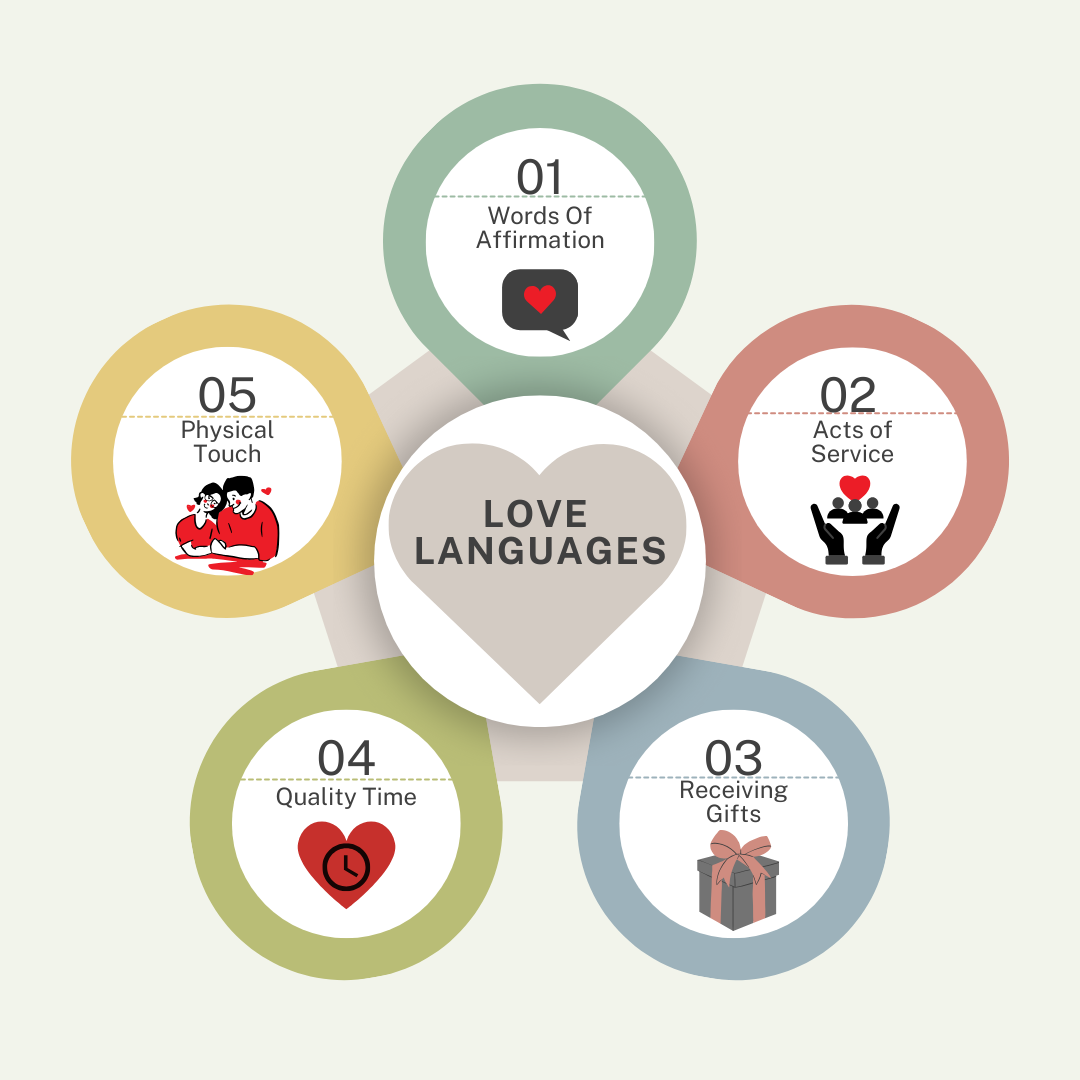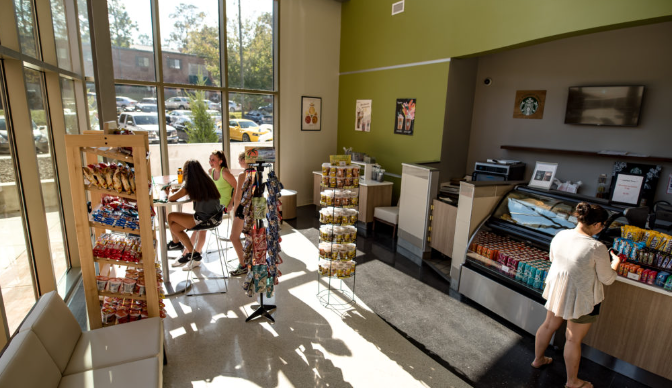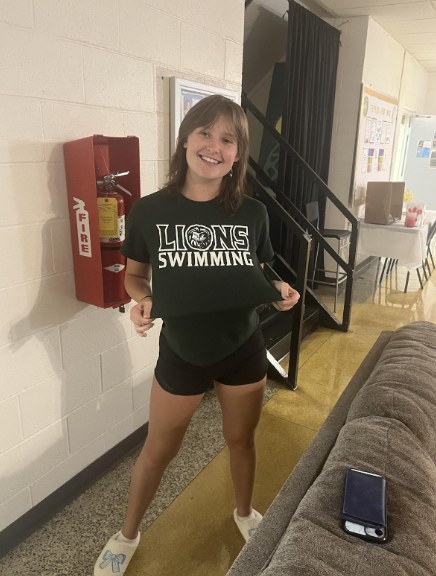As romance is in the air, are you and your partner aware of the types of different love languages? Or do you know your best friend’s love language? If not, don’t worry! This guide will help you discover the other love languages and how they can strengthen your relationships in college.
Dr. Gary Chapman created the theory that individuals speak a particular language for love. Whether it is how they show love through words, gifts or simply being there for the person. Dr. Gary Chapman created books for those who wanted to learn the love languages, and he has books on the five different love languages for marriage, singles and even for children. It is important to learn the love language of your partner, friend or family member, as it can not only help bond with the individual but also create a healthy relationship that will last a lifetime.
So, what does each of the love languages entail?
Words of Affirmation, where you show appreciation through compliments, encouragement, or verbal recognition.
Acts of Service are when helping others or doing something thoughtful for someone brings you joy.
Receiving Gifts is the value placed on tangible or symbolic gestures of love.
Quality Time is the importance of spending undistracted, meaningful time together.
Finally, Physical Touch where expressing affection is through touch (e.g., hugs, hand-holding, etc.).
Everyone has all the languages; however, we all have one that is more dominant than the others. Don’t know your own love language, your partner’s, or your friend’s? Don’t worry; take the quiz or give the quiz and find out!
Quiz:
Answer the following questions to help you identify your primary love language. For each statement, choose the option that resonates with you the most.
- When I’m feeling down, I feel most supported when…
- a) Someone gives me a compliment or encouraging words.
- b) Someone helps me with a task or something I struggle with.
- c) Someone gives me a thoughtful gift.
- d) Someone spends uninterrupted time with me, just talking or hanging out.
- e) Someone offers a hug or physical affection.
- If I could spend a perfect day with a friend, I’d most enjoy…
- a) Talking and complimenting each other.
- b) Doing something practical together, like cooking or studying.
- c) Exchanging small gifts or surprises.
- d) Going for a walk or doing something fun with no distractions.
- e) Snuggling up on the couch or holding hands.
- When I’ve had a stressful week, I feel better when…
- a) Someone reminds me of everything I’m good at and encourages me.
- b) Someone steps in and helps me with my responsibilities.
- c) Someone surprises me with a thoughtful gesture or gift.
- d) Someone takes the time to be with me, whether we talk or not.
- e) Someone gives me a comforting hug or holds my hand.
- When I want to show someone I care, I usually…
- a) Write them a note or say something nice to them.
- b) Do something to make their life easier (run errands, cook for them, etc.).
- c) Get them something meaningful or unique.
- d) Plan a fun activity or spend quality time together.
- e) Give them a hug, high-five, or a touch on the shoulder.
- When I feel loved, I most appreciate…
- a) Words of affirmation or praise.
- b) Acts of service that make my life easier.
- c) Thoughtful or meaningful gifts.
- d) Having one-on-one time with someone who’s fully present.
- e) Physical touch or affection.
How to Score:
Count how many answers you have in each category:
- Mostly a’s – Your primary love language may be Words of Affirmation.
- Mostly b’s – Your primary love language may be Acts of Service.
- Mostly c’s – Your primary love language may be Receiving Gifts.
- Mostly d’s – Your primary love language may be Quality Time.
- Mostly e’s – Your primary love language may be Physical Touch.
If you have a fairly even mix, you may have a combination of love languages, with one slightly more dominant.
Now that you know the right language, how do you speak it? First, watch how your partner or friend shows affection. Do they often compliment or express appreciation, enjoy long chats and deep conversations, or spend time with you, no matter the activity? Based on how they express affection, you can identify the language of love and start speaking it. Start little by little by starting to make the move. For example, below are tips for each language.
1. Words of Affirmation:
- Tip: Be intentional with your words. Compliment them genuinely, praise them and offer encouragement when feeling down. Make sure your affirmations are meaningful and sincere.
- Tip: A quick “I appreciate you” or “you did an amazing job” can go a long way.
2. Acts of Service:
- Tip: Pay attention to tasks that might stress them out and offer assistance (without being asked).
- Tip: Small acts like doing the dishes, taking out the trash or running errands will show that you care.
3. Receiving Gifts:
- Tip: It’s not about spending a lot of money, but showing that you thought of them. Simply getting a flower from the yard could make them happy.
- Tip: Pay attention to what they like or mention so your gift can be personal and thoughtful. The gift will speak volumes.
4. Quality Time:
- Tip: Prioritize undivided attention. Set aside distractions (like phones or work) and focus entirely on them when spending time together.
- Tip: It doesn’t matter if you’re doing something big or small—what counts is the presence and connection.
5. Physical Touch:
- Tip: Be physically present in a way that feels comforting and natural. Initiating touches like hugs, holding hands or touching the arm or back can mean a lot.
- Tip: Make sure you’re mindful of boundaries and respect their comfort zone.
Relationships are complex; with a relationship, whether it be romantic or friendship, a simple miscommunication could ruin a great relationship. You can avoid that heartbreak by learning about others’ love languages and acting on them. If you start showing the attention your partner or friend deserves, they will notice and will want to return the kindness. Remember that communication is key to talking to the other individual and you can even strengthen the relationship. By strengthening the relationship, your relationship might flourish beyond college. Imagine someone you care about and you are speaking their love language. They would be happy to the point that seeing their happiness could help with your own well-being. Test it out, see if you know the language and if you can practice being consistent with them and grow your bond.















